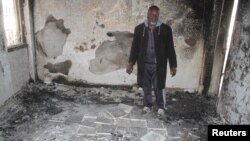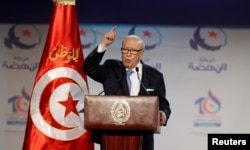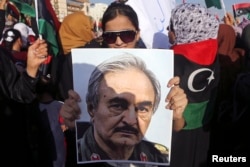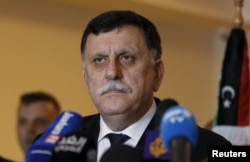Clashes between rival militias in the Libyan capital, Tripoli, last week overshadowed behind-the-scenes political talks sponsored by Egypt, Tunisia and Algeria, and their tenacious efforts to bring together Libya's major political forces.
A militia turf war in Tripoli subsided after rival commanders agreed to suspend their clashes and stop trying to encroach on their adversaries' positions. Libyan media showed extensive damage to homes, vehicles and some public buildings.
Despite the flare-up, patient diplomatic efforts by the three neighboring countries to bring Libya's warring political factions together have continued, but drawn few headlines.
Tunisian President Beji Caid Essebsi has been leading efforts. He says it is his experience that it is best to have all the regional powerbrokers on board if one is going to make an initiative, and that few understand Libya better than its Arab neighbors. He says that is why he urged Egypt and Algeria to help mediate.
Military leader vs. unity government
Egypt has been trying, so far without success, to broker a meeting between Libya's top military figure, General Khalifa Haftar, and the head of its internationally recognized "unity" government, Fayez Seraj.
Haftar, who was given the title of field marshal by the Tobruk-based parliament, has led a military campaign to unite the country since 2015. He has tried to subjugate the country's rag-tag militias, more successfully in the east, than in the west.
Haftar warns that he will not merge his forces with any militias and accuses "unity" Prime Minister Seraj of aligning himself with certain militias that the general has refused to deal with. Haftar maintains that he has not yet met with Seraj.
Seraj, whose government has still not been approved by Libya's internationally recognized parliament, is under pressure by both the militias who control Tripoli and residents of the city, who are angry over instability and economic flux.
Seraj says that his presidential council met with warring militias in Tripoli to impose a cease-fire and end recent bloodshed. He says government ministries have been tapped to help the wounded and compensate for damages.
Critics of Seraj
Seraj's position has been repeatedly undermined by Islamist militia commanders in and around Tripoli. Khalifa al-Ghweil, who heads an Islamist-backed "national urgency government" in Tripoli, says Seraj has made matters worse.
Ghweil argues that Seraj's unity government, rather than uniting the east and west of the country, has succeeded in further fragmenting regions around Tripoli. He says the economy is deteriorating, public services are collapsing and chaos is spreading.
Aguila Saleh, who heads parliament, holds the political keys to the equation, in that his group must vote to approve any legitimate government of the country. So far, he has refused to give his blessing to Seraj.
He says that Libyans must unite to put a stop to the bloodshed and find a political solution free of international meddling or attempts to exclude anyone — such as Haftar — and that such a solution must be arrived at inside Libya.
Martin Kobler is the departing United Nations envoy. He has tried unsuccessfully to get Libyan factions to support Seraj's government, borne of a 2015 international agreement. He has not quite given up on the effort, but considers that the attempt to impose it was a mistake.
The internal Libyan political process must take precedence over international dealings, Kobler says, since all solutions imposed from the outside are bad solutions.
Until now, though, that internal Libyan political process has been thwarted by Islamist militias in the West, unwilling to accept the authority of parliament or Haftar, while Haftar and parliament remain unwilling to share power with the Islamist militias.







